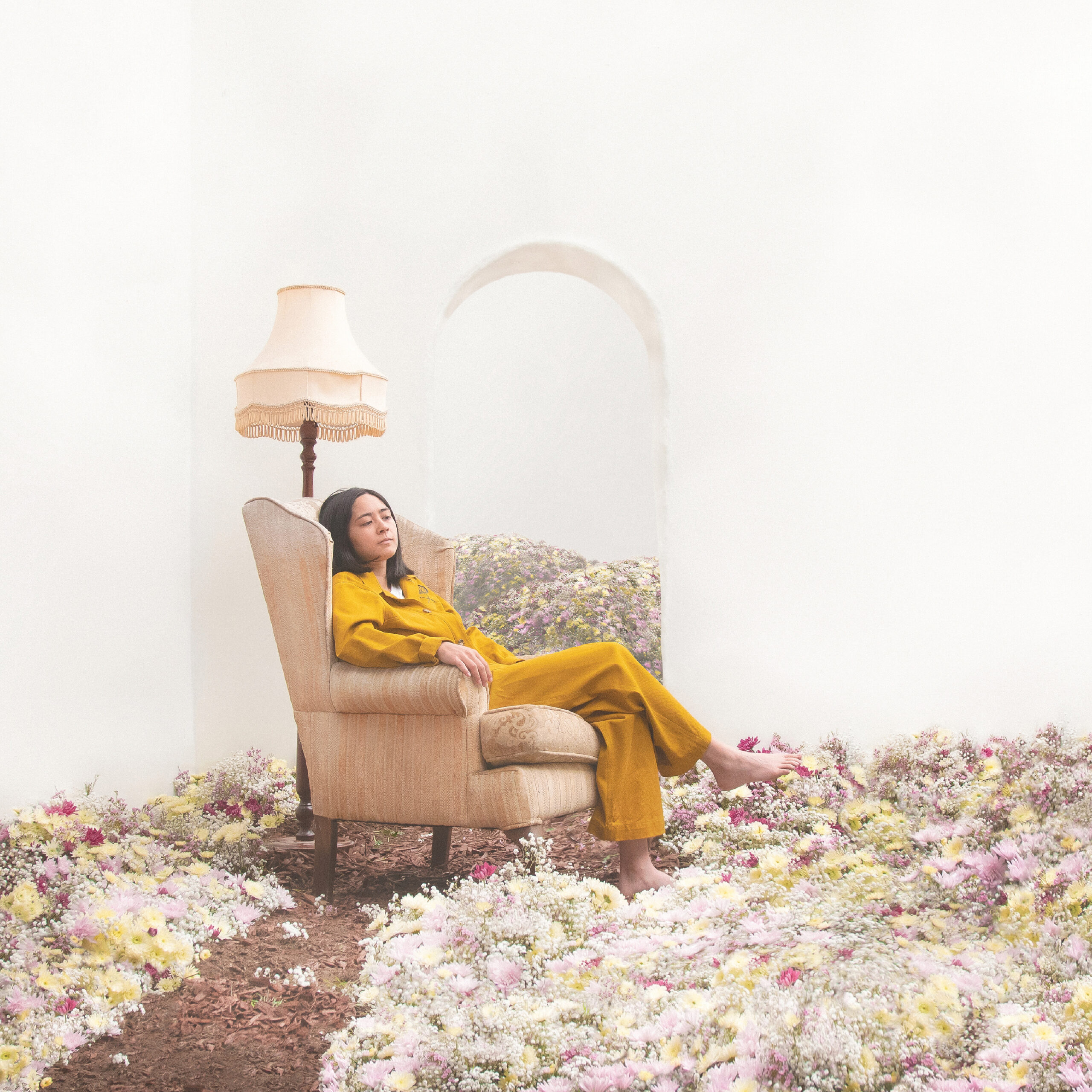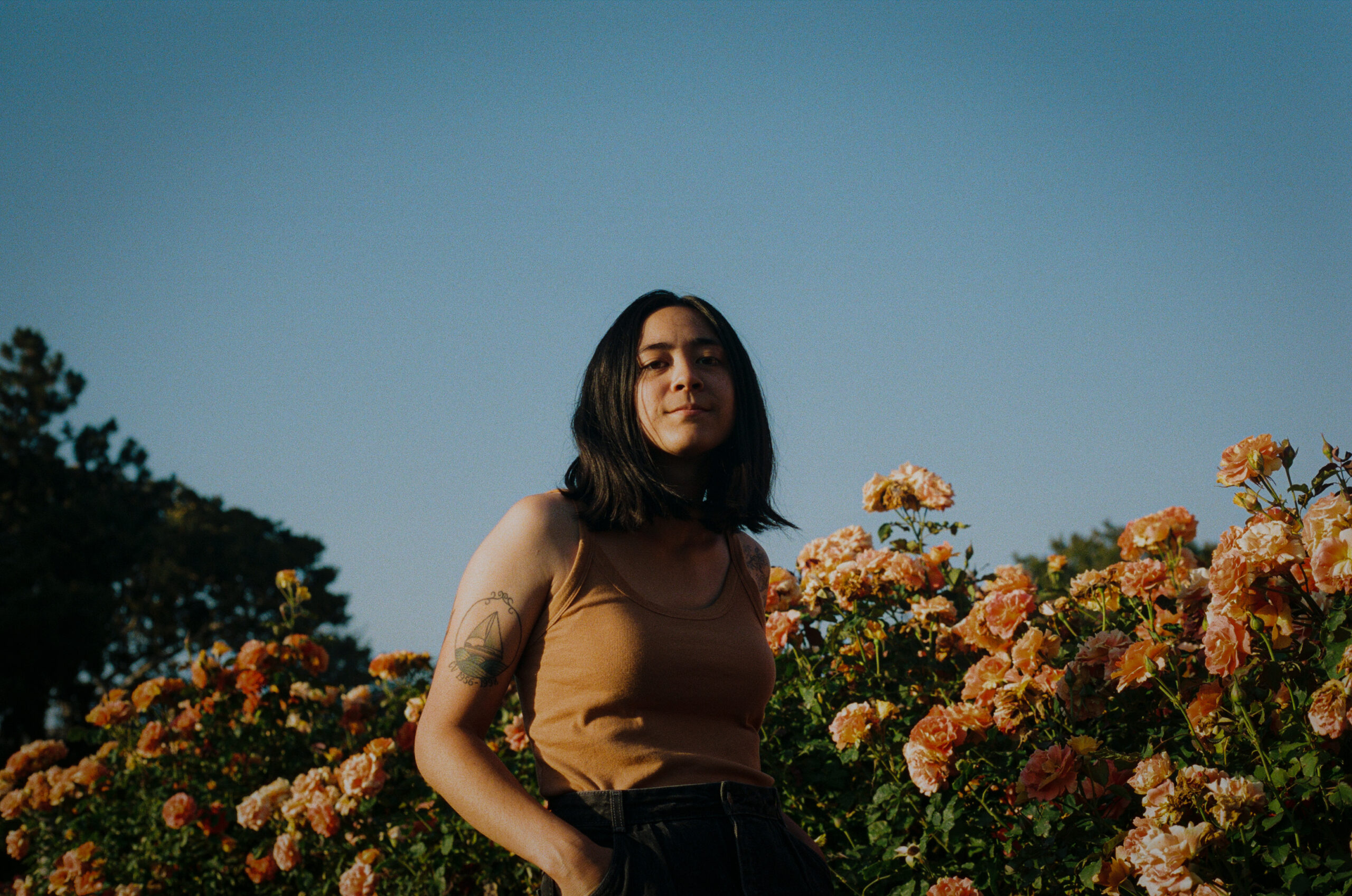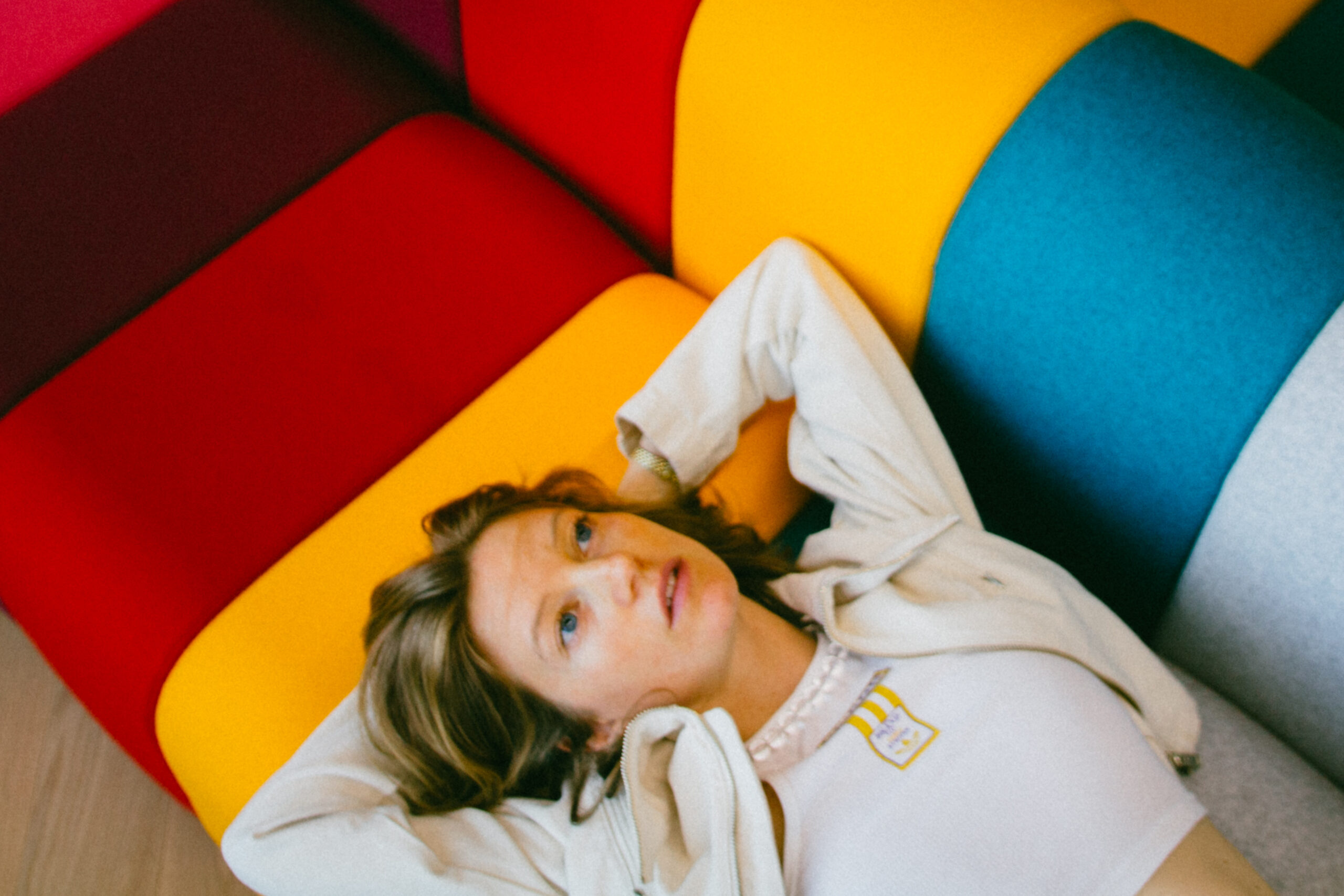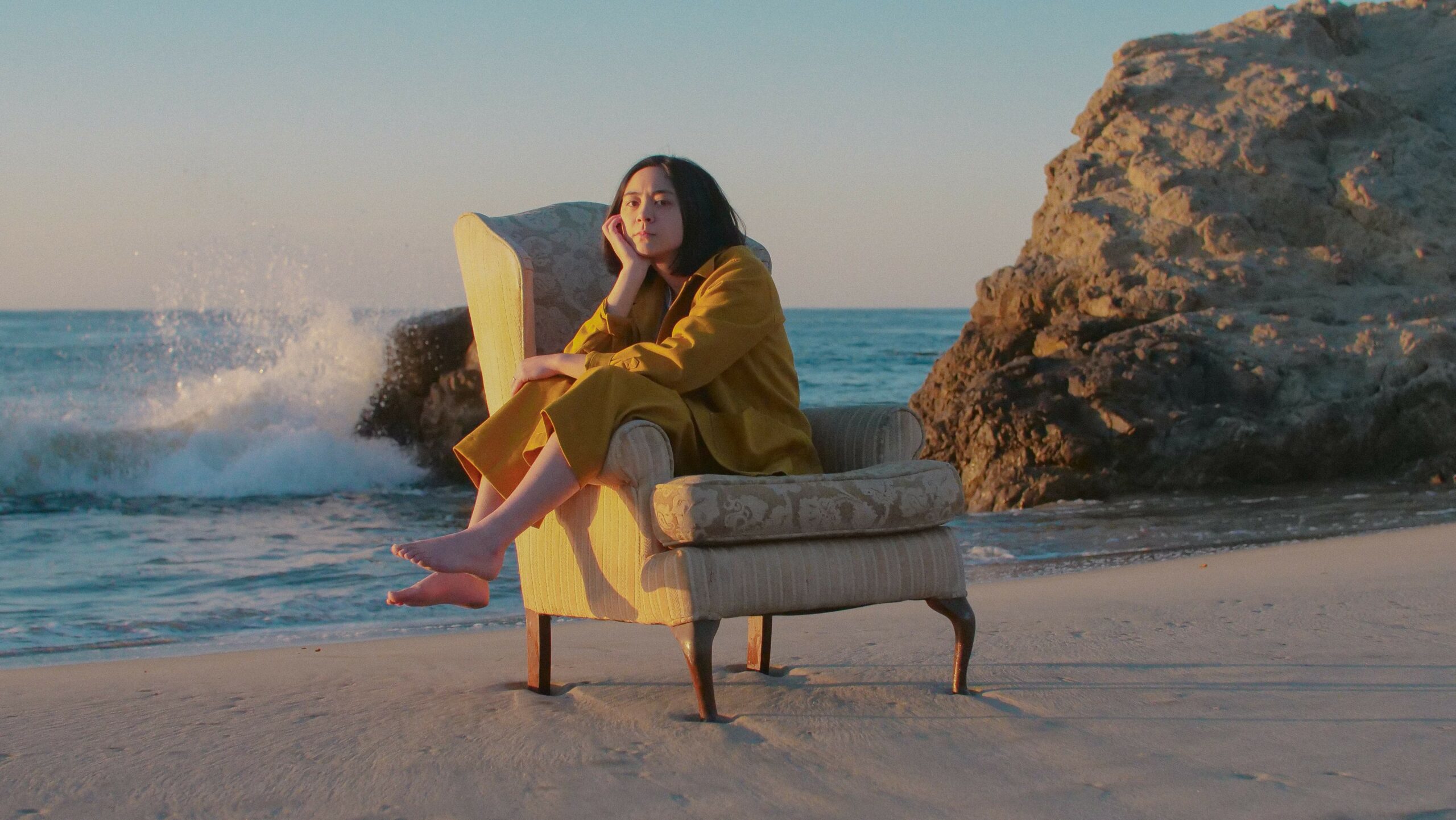Foto-© Nina Raj / Danielle Parsons
Unsere heiß geliebten Women of Indie-Rock bekommen auch in 2021 hochkarätigen Nachwuchs, macht sich doch gerade die in LA lebende Musikerin Lexi Vega mit ihrem musikalischen Projekt Mini Trees auf, in die Fußstapfen von Acts wie Soccer Mommy, Lucy Dacus und Co in den Kathedralen unserer Herzen zu treten. Heute erscheint das Debütalbum Always In Motion und präsentiert eine ganze Bandbreite an Indie-Pop-Perlen, nachdenklichen Texten und mitreißenden Ohrwurm-Melodien – wir sprachen mit der Newcomerin über Identität, Corona-Einflüsse, Mütter, die ihre Teenager-Töchter zu Auftritten ihrer Hardcore-Bands fahren, oder wie man in Songs die eigenen Abgründe verarbeitet bekommt. Unser Interview!
 Lexi sitzt zuhause in LA als wir uns über Zoom zum Gespräch treffen, ab und zu kommt ihr Hund dazu und bellt laut, während sie über ihre musikalische Sozialisierung spricht. Ihr Vater war Drummer und auch wenn er früh gestorben ist, erinnert sie sich noch daran, dass er häufig unterwegs war und ihr schon frühzeitig die Idee einpflanzte, dass Musik als Job eine Option sein kann: „I always believed that this is like a real career that you can pursue and it was always something that I wanted.“ In der Schulzeit entwickelte sich ihr Geschmack durch Hardcore-Bands und sie spielte selbst in verschiedenen Bands als Schlagzeugerin – doch auch wenn man in USA schon früher den Führerschein machen kann, konnten sie als Achtklässler damals noch nicht auf Tour gehen, weshalb ihre Mutter häufig die Bands zu ihren Auftritten fahren und hier und da auch mal eben noch die Ticketanzahl auffüllen musste, damit sie überhaupt auftreten durften: „It was fun, my mom is like a really good sport. Because I also wanted to see a lot of those hardcore shows at this age. So she had to go and take me to those shows. She got used to it very quickly, she could appreciate the music. It wasn’t her preference, but she could appreciate it. When I was in bands at that age non of us were able to drive, so she’d be driving us around for rehearsals or our shows and some shows had pre-sales and we didn’t sell enough, my mom would have to bail us out and pay for like 10 tickets or something.“ Diese Zeiten sind mittlerweile dann zumindest vorbei.
Lexi sitzt zuhause in LA als wir uns über Zoom zum Gespräch treffen, ab und zu kommt ihr Hund dazu und bellt laut, während sie über ihre musikalische Sozialisierung spricht. Ihr Vater war Drummer und auch wenn er früh gestorben ist, erinnert sie sich noch daran, dass er häufig unterwegs war und ihr schon frühzeitig die Idee einpflanzte, dass Musik als Job eine Option sein kann: „I always believed that this is like a real career that you can pursue and it was always something that I wanted.“ In der Schulzeit entwickelte sich ihr Geschmack durch Hardcore-Bands und sie spielte selbst in verschiedenen Bands als Schlagzeugerin – doch auch wenn man in USA schon früher den Führerschein machen kann, konnten sie als Achtklässler damals noch nicht auf Tour gehen, weshalb ihre Mutter häufig die Bands zu ihren Auftritten fahren und hier und da auch mal eben noch die Ticketanzahl auffüllen musste, damit sie überhaupt auftreten durften: „It was fun, my mom is like a really good sport. Because I also wanted to see a lot of those hardcore shows at this age. So she had to go and take me to those shows. She got used to it very quickly, she could appreciate the music. It wasn’t her preference, but she could appreciate it. When I was in bands at that age non of us were able to drive, so she’d be driving us around for rehearsals or our shows and some shows had pre-sales and we didn’t sell enough, my mom would have to bail us out and pay for like 10 tickets or something.“ Diese Zeiten sind mittlerweile dann zumindest vorbei.
Der Name Mini Trees stammt von Lexis Obsession Miniatur-Versionen von Dingen zu sammeln: „It kind of started as a joke, I always had that fascination and all my friends know that about me. So you know, when they travel and they’d see something, they’d buy it for me. So I just had a funny collection of little things.“ Sie hält einen Mini-Micro-Ständer in die Kamera und lacht. Insgesamt wirkt sie sehr ausgeglichen und fröhlich – wie ihre Songs. Doch auch dort liegen häufig unter der fröhlichen Oberfläche die seelischen Abgründe, was sie erklärt: „I like that contrast personally, I think that will probably change over time in my songwriting. A song like that, that I really like is Nobody by Mitski, because it’s just this really fun disco song, the drums are like a disco beat, it’s so poppy, it’s so fun, but the lyrics are kind of sad. I think it’s kind of a covid mechanism, to put it in a fun song helps me not to take it too seriously. Hopefully it’s relatable too. There are a couple of songs that sound like and are like that on the album, because I don’t always do it that way, but I have a tendency to do so.“
Überhaupt hat die Pandemie, die damit um sich greifenden Ängste und der neuen Lebensstil, der daraufhin Einzug hilt, viele Spuren auf dem Album hinterlassen – wenn Lexi es auch nicht als reines Covid-Album versteht: „I wrote it last year, during the pandemic, but I think it draws from things long before the pandemic. There are defiantly songs about anxiety around COVID and all of that, but it just became a larger reflection about things in my life, how I think about life and one of the themes of the album – and this is also where the album name came from – is like, for better or for worse, time always keeps moving forward. Sometimes it can be comforting, you know, if it’s like, we are in the middle of the pandemic and it feels like it’s never gonna end, but we know that things are gonna move forward. You know, humans are gonna keep adapting and we are here for each other, we are very resilient. And I was kind of deciding to choose a more optimistic perspective. This will pass, you know? But then I think there is also an aspect of time moving forward that can be kind of intimidating and sort of recognizing: I’m getting older. Or other people in your life are getting older, relationships are changing over the years. And sometimes, when things are really good, I feel like, I don’t want that to change, I don’t want to move forward, I love where I’m at. There is this push and pull with that idea for me – and I touch on that in the album in a lot of different ways.“

Die Single Carrying On hingegen ist direkt von Covid beeinflusst: „Basically I started writing this song in the heat of the pandemic and being in LA I was overwhelmed about how crowded it is and about how it’s kind of hard to get away. So I went into the dessert, just a couple of hours outside of LA, just some kind of get-away into nature and to separate myself from people a little bit. This was like July last year and at that point it felt like everyone had just settled into this new pandemic lifestyle and so in some ways it felt normal to be masking up to go to the grocery store, sensitizing your hands constantly – and doing all this careful things just become this new routine. And it kind of hit me: ‚This is wild!‘ During the pandemic I was often waking up and asking myself: ‚Was this just a bad dream? Oh no, this is still happening!‘ It didn’t feel real at times. And then it kind of got me to really freak out and I was questioning if I could hold everything together and that’s the theme of that song.“ Klanglich entwickelte sich der Song jedoch erst nach und nach – was auch gerade mit Lexis langjährigem Freund und Produzenten Jon Joseph zu tun hatte…und mit dem 2009er Album Wolfgang Amadeus Phoenix der französischen Indie-Pop-Band Phoenix: „When I was writing that one, as a demo it didn’t sound that upbeat, energetic and fun. When I was bringing it into the studio and working on it with Jon, I mentioned being nostalgic at that time, as I was listening to Phoenix’ Wolfang Amadeus record and we then were listening to it again, to songs like Lasso and Girlfriend. And I was like: ‚It would be fun to tab in some of these sonic qualities, bring some of those driving hi-hat samples and that big guitar riffs into that song‘ And so we started changing it to this much more driving song.“
Überhaupt ist Jon ein wichtiger Einfluss für Mini Trees, war er doch von Anfang an dabei und überzeugte Lexi auch immer wieder ihre eigene Zurückhaltung abzulegen, sich mehr auszuprobieren und ihre Grenzen zu verschieben: „I worked with my friend John since the beginning of the project. I feel very lucky, because we have a really good collaborative partnership, where I feel like he really understands what I’m trying to create. He pushes me sometimes outside my comfort zone, which has helped me a lot to grow as a songwriter.“
Apropos Komfortzone: häufig handeln ihre Songs von Themen und Gefühlen, die Lexi ansonsten nicht gerne behandelt oder ausspricht, doch durch die Songs beginnt sie häufig sich selbst mit ihnen auseinanderzusetzen. Statt sich mit ihrer Familie und ihren Freunden darüber zu unterhalten: „It’s still pretty much the case. It’s funny. It’s more so with my family. It’s a little ironic, because they are the closest people to me, but I think it’s also hard to share some of these personal thoughts and feelings. And so sometimes it’s easier for me to just put it in a song – and at the time it will be released and eventually they will hear it, I will deal with it. They will asked me about it then and we will talk about it then. I also think songwriting for me is a way to process a lot of my thoughts and so it kind of comes before really understanding something well enough to talk about to with another person. It’s sort of me just figuring it out. So in some cases it’s just like the natural process for me.“ Umso unwohler fühlt sich Lexi dementsprechend wenn sie plötzlich einen ihrer Songs bei der Party eines Freundes hört: “It’s kind of awkward and often I think: ‘Ah, I’m hating myself again’ Not really like party music…”

Das Album entlässt einen übrigens mit dem Song Otherwise und der Einsicht, dass es vielleicht auch ok ist, nicht alle Antworten auf die großen Fragen des Lebens zu haben: „It’s kind of classic me to do it. Sonically it fitted, as it was quiet and has this big crescendo, but I liked ending there as it is defiantly a more melancholic song, but also ending on a note, that there are not always answers to our questions, it can be good and bad. As I think a lot of things can be very challenging in life and you have questions around people that you’ve lost or like ‚Why did this happen to me?‘-kind of questions – I think that it is frustrating to know that there is not an answer to all of these questions, but – and I think that is something that I’ve become more comfortable with over time – there is some kind of weird solace or piece in learning to be ok with that though and learning to be ok with some of the mysteries in life. And so I kind of wanted to end on this road, it’s not meant to make people super depressed, maybe more want to reflect, I guess. And I think that maybe will change for me, I think maybe on the next album I will be much more confident about things and not questioning reality so much, but that was just the place I was at.“
 Apropos „place I was at“ – lange fühlte sich Lexi als Kind von einem in Cuba-geborenen Vater und einer japanisch-amerikanischen Mutter fehl am Platz und versuchte in einer hauptsächlich von weißen bewohnten Umgebung nicht aufzufallen, wovon auch das Album handelt: „Being mixed is a really wonderful thing, there is so much cultural heritage that I can tap into and learn about. But I think at times, I’ve never really known where I fit in. Growing up my parents were trying hard to give my sister and I a great life and get into areas where there are good public schools and they wanted what is best for us. That’s something that I’m always very grateful for. So there were never any issues about being mistreated or something like that. I think what I got to learn in my early twenties or so, was that I wanted to blend in with the people around me, I wanted to look like anybody else. It’s like I said, it wasn’t something raciest or something like that, I think I was just very common the butt-end of jokes of my friends and the people I knew, because I was the only one who was different. And for a long time I played along, because I wanted to be liked and sometimes I made my own jokes about myself, because I knew it would get a good reaction out of people and that was what I was seeking at the time. Eventually I was like: ‚I hate this! I don’t like the way this feels, I feel like an outsider‘ It took my time to realize that. And now I’m really grateful for my family, where I come from, I wanna learn more about it, but there is still a lot that I’m uncovering about my family, about who we are. I think it will be a long journey about discovering that.“
Apropos „place I was at“ – lange fühlte sich Lexi als Kind von einem in Cuba-geborenen Vater und einer japanisch-amerikanischen Mutter fehl am Platz und versuchte in einer hauptsächlich von weißen bewohnten Umgebung nicht aufzufallen, wovon auch das Album handelt: „Being mixed is a really wonderful thing, there is so much cultural heritage that I can tap into and learn about. But I think at times, I’ve never really known where I fit in. Growing up my parents were trying hard to give my sister and I a great life and get into areas where there are good public schools and they wanted what is best for us. That’s something that I’m always very grateful for. So there were never any issues about being mistreated or something like that. I think what I got to learn in my early twenties or so, was that I wanted to blend in with the people around me, I wanted to look like anybody else. It’s like I said, it wasn’t something raciest or something like that, I think I was just very common the butt-end of jokes of my friends and the people I knew, because I was the only one who was different. And for a long time I played along, because I wanted to be liked and sometimes I made my own jokes about myself, because I knew it would get a good reaction out of people and that was what I was seeking at the time. Eventually I was like: ‚I hate this! I don’t like the way this feels, I feel like an outsider‘ It took my time to realize that. And now I’m really grateful for my family, where I come from, I wanna learn more about it, but there is still a lot that I’m uncovering about my family, about who we are. I think it will be a long journey about discovering that.“
Sie selbst sucht auch jetzt wieder einen Platz – in der Indie-Musik-Szene, die aber in ihren Augen ein perfekter Ort ist, als Sammelbecken Gleichgesinnter: „I think it’s awesome to see that representation, to see so many female guitar players and songwriter to look up to. When growing up all my favorite musicians were guys and now it’s like a totally different world. I don’t know all of these people, I just started to know Jessica Dobson from Deep Sea Diver and she is like an amazing guitar player and had such an amazing career, playing like for The Shins, Beck and all these amazing people. It’s really cool to have so many women to look up to, I’m certainly very excited how indie music turned out. There are lots of great, great women out there, who are kind of paving the way. And not just women, but all kinds of people, that weren’t presented in music like before. So I love that and indie music is defiantly a very welcoming place for all kinds of people and there is room for everybody.“ Und gleichzeitig ist es auch gut, dass sich viele in der Szene gegenseitig unterstützen, denn: „Trying to pursue a career in music is really hard, there’s a lot of ups and downs and even people who are really successful can feel beat down at times. So I think having friends in the scene and having some kind of community is really helpful, especially when it’s hard. I found that for sure in my little female LA music scene, that I’m part of, it really really helps.“
Mini Trees live (als Support von Briston Maroney):
11.01.22 Privatclub, Berlin
12.01.22 Molotow, Hamburg










